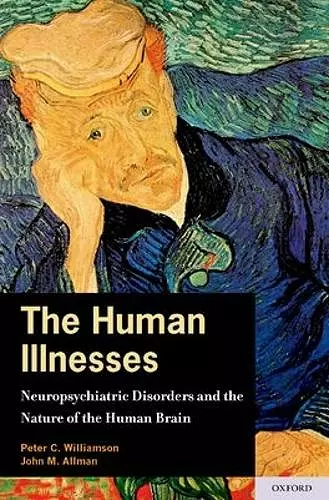The Human Illnesses
Peter Williamson author John Allman author
Format:Hardback
Publisher:Oxford University Press Inc
Published:3rd Feb '11
Currently unavailable, and unfortunately no date known when it will be back

The genetic correlates of neuropsychiatric disorders are now known, but none have come close to explaining the great variety of human psychiatric illnesses. This volume, written by a neuropsychiatrist and an evolutionary biologist, offers a new paradigm for understanding these disorders. Proposing that neuronal pathways which underlie neuropsychiatric conditions mirror unique human capabilities, the authors iterate a new paradigm by which to understand human psychiatric illnesses. Human capabilities such as theory of mind, language, and complex social behaviors are explored through their histological, neuroanatomical and functional brain imaging correlates. The capacity for representation, the authors suggest, is central to the understanding of the human brain. Brain structures such as the frontal pole, temporal pole, and fronto-insular cortex are highly developed in humans and are associated with representation. Other brain regions, including the dorsal anterior cingulate cortex, auditory cortex, and hippocampus, are linked with directed effort while the ventral anterior cingulate cortex, orbital frontal cortex, and amygdala are related to emotional encoding. Both networks interact with representional regions and the dorsolateral prefrontal cortex. Conditions like schizophrenia may result, in part, from a failure of the networks associated with directed effort while bipolar disorders may arise from a failure of networks associated with emotional encoding. Similarly, autism may result from a failure of representational brain regions; frontotemporal dementia may be associated with failure of several discrete networks in later life. From this perspective, neuropsychiatric disorders are selective failures of brain networks involved in the integration of cognition, affect and perception. A better understanding of these brain networks will assist psychiatric and mental health researchers in the search for environmental factors and genetic correlates of disorders as well as aid in the development of more effective treatments for these diseases. This volume will be of interest to psychiatrists, neurologists, psychologists, biologists, and imaging scientists--anyone who has ever wondered what makes the human brain human.
The thesis of the book is reasonable and there is a need to integrate findings from genetics, imaging, neuroscience, and neurocognition into a comprehensive model. Regardless of whether readers agree or disagree with the premise, this will certainly be a step in the right direction. --S. Kristian Hill, PhD Research Assistant Professor of Psychiatry Neuropsychologist Department of Psychiatry and Center for Magnetic Resonance Research University of Illinois at Chicago "The thesis is certainly provocative, worth elaborating in a book." --Gunvant Thaker, MD Professor of Psychiatry University of Maryland School of Medicine Chief, Schizophrenia Disorders Maryland Psychiatric Research Center Associate Editor, Schizophrenia Bulletin "This spellbinding new book, which presents an important theory of the etiology of the major neuropsychiatric disorders, may be a significant contribution, particularly since the hypotheses are testable. However, only studies and time will tell. I highly recommend the book to anyone interested in the brain and the mind." -- Doody's "Williamson and Allman provide an array of current research findings on the neurophysiology, anatomy, and genetics of common mental disorders as well as evolutionary explanations of the neuroscience underlying cognitive processes such as language, representational thought, and the theory of mind." -- PsycCRITIQUES "The volume is a compact, captivating, and current update of vital scientific advances that reflect upon the uniqueness of the human brain, mind, and condition. I highly recommend this book to students and practioners of neurology, psychiatry, and neuropsychiatry as well as to others interested in understanding the unique nature of the remarkable human brain." -- Stuart C. Yudofsky, M.D. The American Jouranl of Psychiatry
ISBN: 9780195368567
Dimensions: 157mm x 236mm x 20mm
Weight: 499g
256 pages